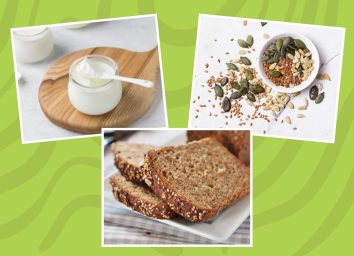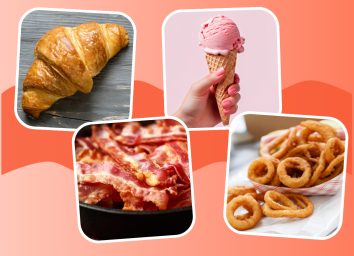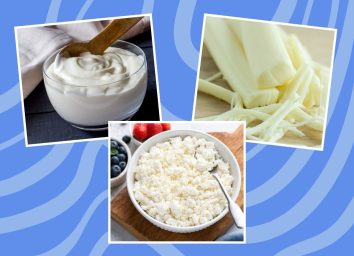10 Effective Eating Habits to Lose Belly Fat as You Age

Losing weight can be a challenge, but losing abdominal fat, also known as belly fat, may be even harder. Belly fat is the fat that sits around your abdominal organs and is often harder to lose than the subcutaneous fat that's under your skin. Hormonal factors, such as elevated cortisol levels in response to stress, genetics, alcohol intake, and metabolic changes can all make it harder to burn belly fat compared to fat in other areas of the body. And if it isn't already hard enough, trying to lose belly fat gets even tougher with age.
Your risk of having excess visceral fat increases as you get older, mainly because of changes in metabolism, muscle mass, and ability to get enough movement throughout your day. All of these factors can make it challenging to drop the extra pounds with each passing year, which can unfortunately impact your health, as having extra visceral fat has been linked to an increased risk of stroke, heart disease, and diabetes. Thankfully, there are lifestyle changes you can make to help.
We talked with a couple of registered dietitians to get their advice on effective eating habits you can adopt to lose belly fat as you age. Read on to learn about their tips, and for more healthy aging tips, check out these 6 Superfoods That Can Slow Aging.
Eat more fiber-rich foods.
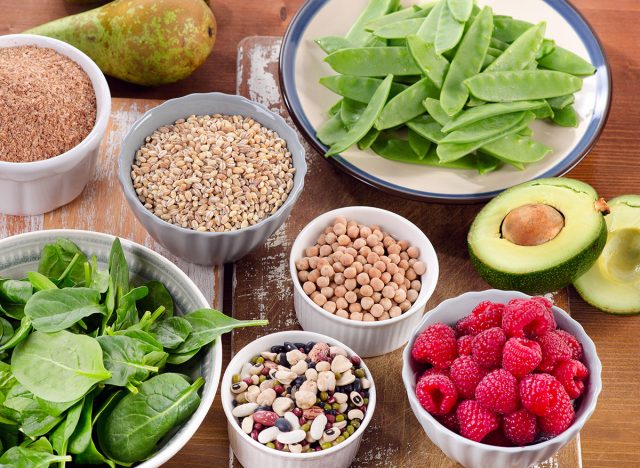
Fiber-rich foods can do wonders for your health as you age, including reducing the risk of cardiovascular disease and certain cancers, as well as helping with your weight loss and belly fat loss goals. But even though this nutrient is so good for us, many people struggle to meet the daily recommended amount of around 18-38 grams per day. This is why Mary Sabat MS, RDN, LD encourages people to increase their fiber intake when they want to improve their health as they get older.
"Incorporating fiber-rich foods like whole grains, beans, fruits, and vegetables into your diet helps keep you full, regulates blood sugar levels, and aids in digestion, which can prevent overeating and bloating," says Sabat. "Because fiber-rich foods can promote a feeling of fullness, they can also reduce overall calorie intake."
As if that weren't enough reason to focus on fiber, Sabat adds, "A diet rich in fiber supports a healthy gut microbiome, which has been linked to reduced inflammation and a lower risk of visceral fat accumulation."
Increase your protein intake.
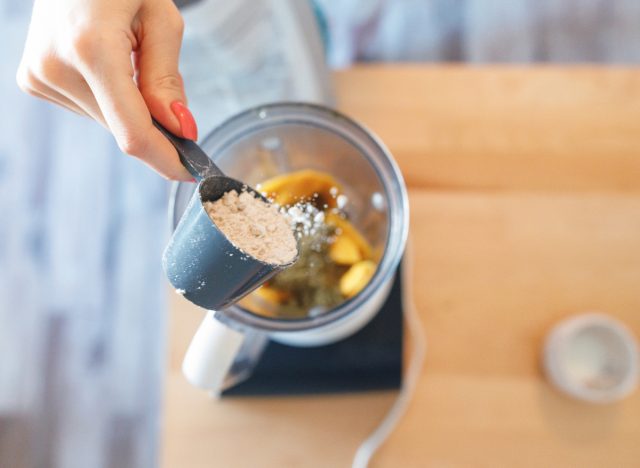
Losing belly fat as you age is nearly impossible without adequate levels of protein in your daily diet. For starters, "Protein is essential for preserving and building lean muscle mass, which, in turn, can elevate your metabolism, facilitating the management and reduction of abdominal fat," says Sabat.
Similar to fiber, eating protein-rich foods can also help you feel more full after eating. "Protein is responsible for promoting feelings of fullness and satisfaction, which can act as a natural deterrent against overeating and unnecessary snacking, ultimately reducing your overall calorie intake," Sabat adds.
And lastly, "Protein can influence hormonal responses related to hunger and fat storage, creating a more favorable environment for effective weight management," says Sabat.
To reap all of these amazing benefits, Sabat suggests including more lean sources of protein in your diet, like fish, poultry, tofu, and legumes.
Eat more healthy fats.
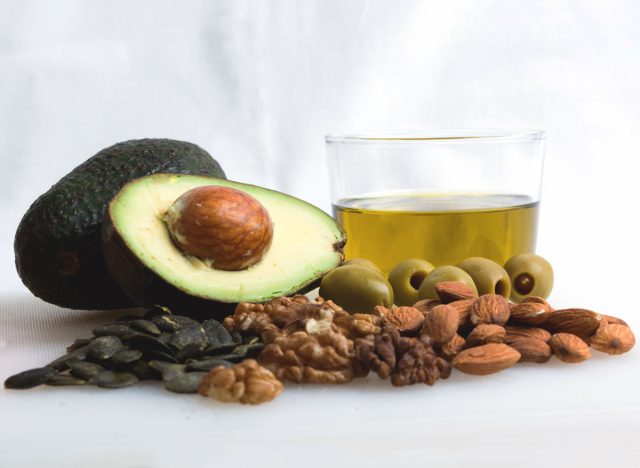
We now know that eating more fiber and protein can help you lose belly fat as you get older, and Sabat says adding in sources of healthy fats can make a significant impact as well.
"Choose sources of healthy fats like avocados, nuts, seeds, and olive oil, because healthy fats offer a sense of fullness and satisfaction, which can curb overeating and help regulate calorie intake, ultimately reducing the risk of excess abdominal fat," Sabat says. "These fats also can help stabilize blood sugar levels, preventing the insulin spikes that can trigger fat storage around the abdomen."
Sabat also notes that "Additionally, these fats can aid in nutrient absorption, ensuring your body gets the necessary vitamins and minerals to support a healthy weight."
Limit your ultra-processed food consumption.
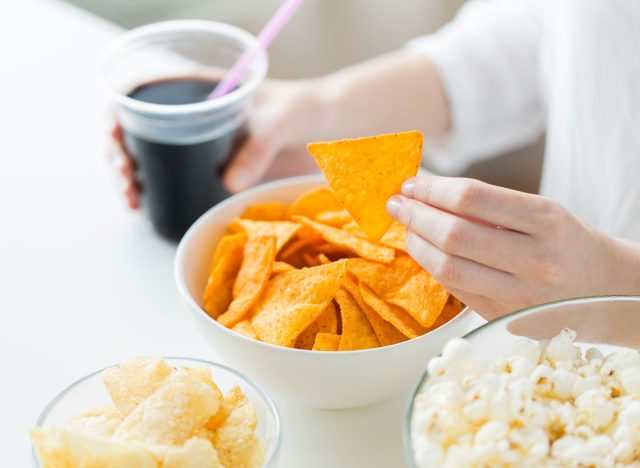
Adding more protein, fiber, and healthy fats to your daily routine can all be critical moves toward your weight loss goals, but there are also certain types of foods worth limiting as well.
Sabat suggests "Reducing your intake of highly processed foods and opting for whole, minimally processed foods whenever possible."
This is because ultra-processed foods—think pre-packaged snacks and baked goods, fast food, candy, sodas, etc.—are often extremely high in added sugar, unhealthy fats, and sodium, according to Sabat. "These can contribute to excessive calorie intake and water retention, which can lead to abdominal bloating and fat gain."
Another undesirable thing about eating a lot of processed foods is that "these foods are typically low in fiber and nutrients, offering little satiety and nutrition," says Sabat, "which makes it easier to overeat."
You don't have to fully avoid these foods, but be mindful of how much you're consuming when trying to achieve your goals.
Eat a balanced diet.

At the end of the day, focusing on one or two specific nutrients is helpful for your health goals, but the best thing you can do is make sure you're also eating a balanced diet full of all the important food groups.
"Maintain a balanced diet of fruits, vegetables, lean proteins, whole grains, and healthy fats," says Sabat. "This helps provide essential nutrients and prevents overconsumption of any one type of food."
Sabat also adds that "A balanced diet provides the necessary nutrients to maintain muscle mass, which can help boost metabolism and burn calories, including those from abdominal fat."
"Most importantly, a balanced diet promotes stable blood sugar levels, minimizing insulin spikes and the storage of fat around the abdomen.
Practice portion control.
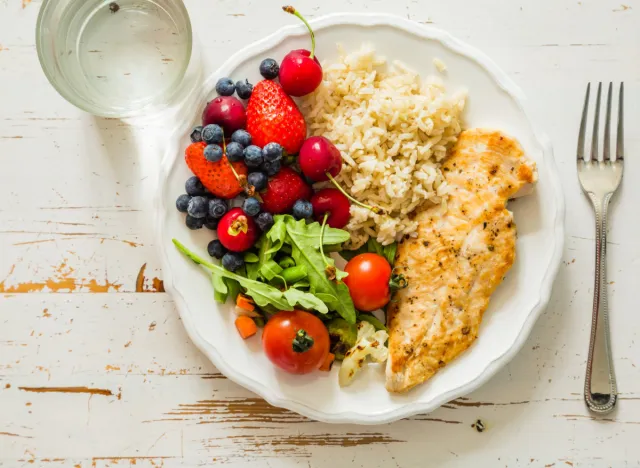
The quality of your food is crucial in achieving better health as you age, but Sabat also recommends focusing on portion sizes as well.
"Be mindful of portion sizes because as you age, your metabolism tends to slow down, so it's important to eat smaller, well-proportioned meals to avoid excess calorie intake," she says.
She adds, "Controlling portions not only helps you manage your calorie intake, reducing the risk of excess calorie storage as fat, particularly in the abdominal area, but it also encourages mindful eating, making you more aware of your body's hunger and fullness cues, which can prevent overeating and unnecessary snacking."
Avoid excess sugars.
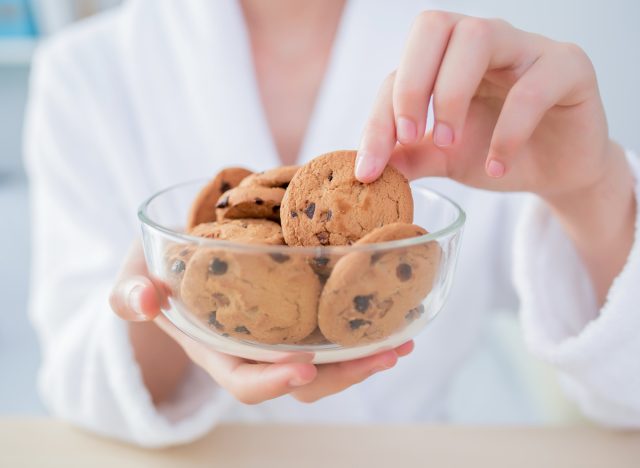
According to Morgyn Clair, MS, RDN, author at Fit Healthy Momma, cutting out sugar (especially sugary beverages) or lowering your intake of it is one of the best ways to lose belly fat as you age. "Studies consistently show that excess sugar leads to unwanted fat, especially fat that's stored in the abdomen," she says.
For example, a study published in the Journal of Nutrition found that regular consumption of sugar-sweetened beverages was associated with an increase in the volume of abdominal fat in adults.
Track calories—if that's what works for you.

Another tip that Clair has for those trying to lose belly fat as they get older is to try tracking their calories during the day. Although this process may not work for everyone, Clair says if you're curious about it, you can try tracking for a little while to get a good idea of what your body needs.
"Many people underestimate how much they are actually eating, so I suggest tracking for at least a week so you can get a good picture of your current calorie intake," says Clair, "and that makes it easier to point out meals and days when your calories are too high, which contribute to excess fat storage."
Switch to whole grains.
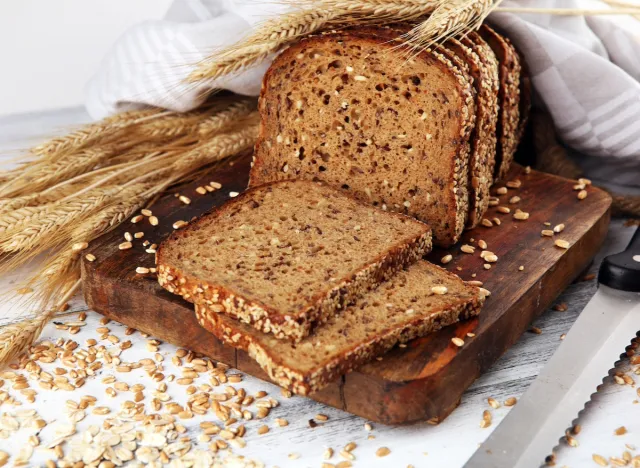
It may be time to ditch the white bread and refined carbs if you're trying to lose weight this year.
According to Elizabeth Ward, MS, RDN, co-author of The Menopause Diet Plan, A Natural Guide to Hormones, Health, and Happiness, "Eating whole grains instead of highly refined grains is associated with a lower risk for excess belly (visceral) fat." This has to do with the increased levels of fiber and protein in whole grains.
And if you're wondering where to start on switching to whole grains, Ward suggests "Whole-grain bread, cereals, quinoa, whole-wheat pasta, or popcorn."
Consume most of your calories before dinner.

Another habit that may be contributing to more belly fat is one that often goes completely unnoticed by those who are trying to lose weight, and that is eating the majority of your calories in the evening hours.
"Your body processes food more easily earlier in the day because that's when insulin is more effective, which is the hormone that moves glucose produced by digestion into your cells for them to use as energy," says Ward. "And as insulin becomes increasingly sluggish as the day wears on, eating heavily at the end of the day boosts the chances of storing what you eat as fat in your abdominal area."
This article has been updated since its original publishing with additional entries and research.
- Source: Age Related Shift in Visceral Fat
- Source: Dietary fiber: Essential for a healthy diet
- Source: Therapeutic Benefits and Dietary Restrictions of Fiber Intake: A State of the Art Review
- Source: The Effect of Fiber on Satiety and Food Intake: A Systematic Review
- Source: Fiber: The Carb That Helps You Manage Diabetes
- Source: Dietary Fiber Intake and Gut Microbiota in Human Health
- Source: Dissecting the role of the gut microbiota and diet on visceral fat mass accumulation
- Source: Recent Perspectives Regarding the Role of Dietary Protein for the Promotion of Muscle Hypertrophy with Resistance Exercise Training
- Source: The Effects of Increased Protein Intake on Fullness: A Meta-Analysis and Its Limitations
- Source: Clinical Evidence and Mechanisms of High-Protein Diet-Induced Weight Loss
- Source: Fat Detection: Taste, Texture, and Post Ingestive Effects
- Source: NHS; Fat: the facts
- Source: Healthy eating for blood sugar control
- Source: Potential link between excess added sugar intake and ectopic fat: a systematic review of randomized controlled trials
- Source: Sugar-Sweetened Beverage Consumption Is Associated with Abdominal Fat Partitioning in Healthy Adults
- Source: Whole- and refined-grain intakes are differentially associated with abdominal visceral and subcutaneous adiposity in healthy adults: the Framingham Heart Study

